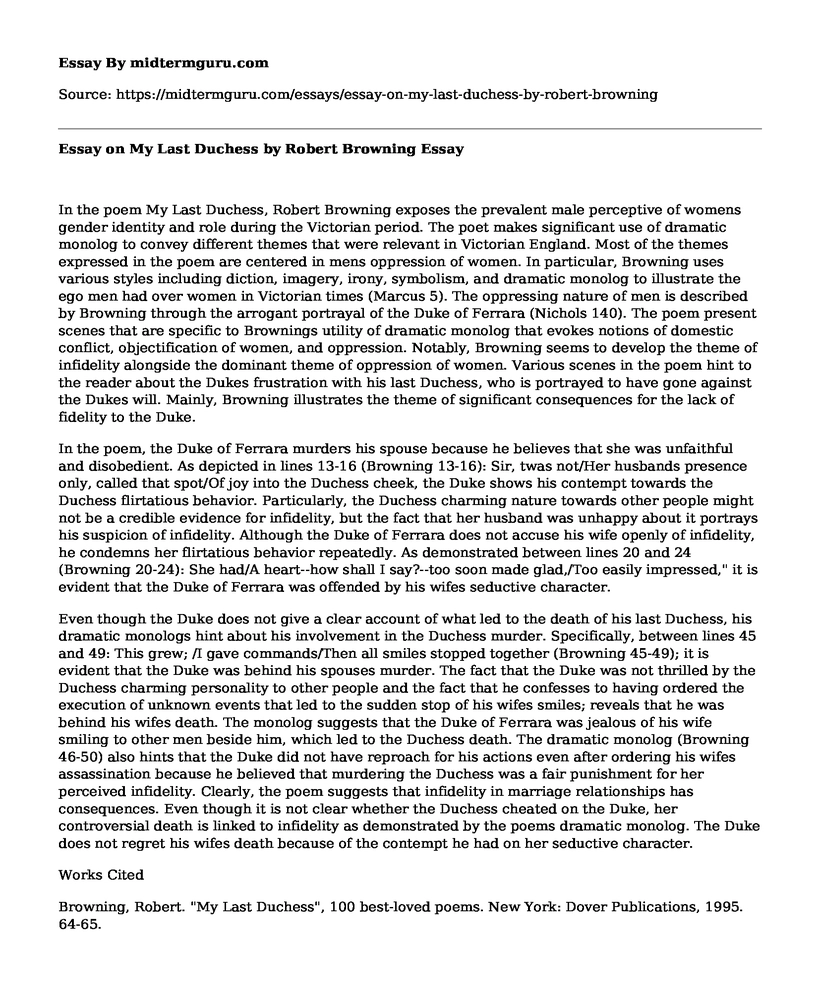In the poem My Last Duchess, Robert Browning exposes the prevalent male perceptive of womens gender identity and role during the Victorian period. The poet makes significant use of dramatic monolog to convey different themes that were relevant in Victorian England. Most of the themes expressed in the poem are centered in mens oppression of women. In particular, Browning uses various styles including diction, imagery, irony, symbolism, and dramatic monolog to illustrate the ego men had over women in Victorian times (Marcus 5). The oppressing nature of men is described by Browning through the arrogant portrayal of the Duke of Ferrara (Nichols 140). The poem present scenes that are specific to Brownings utility of dramatic monolog that evokes notions of domestic conflict, objectification of women, and oppression. Notably, Browning seems to develop the theme of infidelity alongside the dominant theme of oppression of women. Various scenes in the poem hint to the reader about the Dukes frustration with his last Duchess, who is portrayed to have gone against the Dukes will. Mainly, Browning illustrates the theme of significant consequences for the lack of fidelity to the Duke.
In the poem, the Duke of Ferrara murders his spouse because he believes that she was unfaithful and disobedient. As depicted in lines 13-16 (Browning 13-16): Sir, twas not/Her husbands presence only, called that spot/Of joy into the Duchess cheek, the Duke shows his contempt towards the Duchess flirtatious behavior. Particularly, the Duchess charming nature towards other people might not be a credible evidence for infidelity, but the fact that her husband was unhappy about it portrays his suspicion of infidelity. Although the Duke of Ferrara does not accuse his wife openly of infidelity, he condemns her flirtatious behavior repeatedly. As demonstrated between lines 20 and 24 (Browning 20-24): She had/A heart--how shall I say?--too soon made glad,/Too easily impressed," it is evident that the Duke of Ferrara was offended by his wifes seductive character.
Even though the Duke does not give a clear account of what led to the death of his last Duchess, his dramatic monologs hint about his involvement in the Duchess murder. Specifically, between lines 45 and 49: This grew; /I gave commands/Then all smiles stopped together (Browning 45-49); it is evident that the Duke was behind his spouses murder. The fact that the Duke was not thrilled by the Duchess charming personality to other people and the fact that he confesses to having ordered the execution of unknown events that led to the sudden stop of his wifes smiles; reveals that he was behind his wifes death. The monolog suggests that the Duke of Ferrara was jealous of his wife smiling to other men beside him, which led to the Duchess death. The dramatic monolog (Browning 46-50) also hints that the Duke did not have reproach for his actions even after ordering his wifes assassination because he believed that murdering the Duchess was a fair punishment for her perceived infidelity. Clearly, the poem suggests that infidelity in marriage relationships has consequences. Even though it is not clear whether the Duchess cheated on the Duke, her controversial death is linked to infidelity as demonstrated by the poems dramatic monolog. The Duke does not regret his wifes death because of the contempt he had on her seductive character.
Works Cited
Browning, Robert. "My Last Duchess", 100 best-loved poems. New York: Dover Publications, 1995. 64-65.
Marcus, Sharon. Between women: Friendship, desire, and marriage in Victorian England. Princeton University Press, 2009.
Nichols, Kenneth. "Case Study# 9: My Last Duchess by Robert Browning." Public Voices 14.2 (2016): 137-155.
Cite this page
Essay on My Last Duchess by Robert Browning. (2021, May 25). Retrieved from https://midtermguru.com/essays/essay-on-my-last-duchess-by-robert-browning
If you are the original author of this essay and no longer wish to have it published on the midtermguru.com website, please click below to request its removal:
- Essay on the Beekeepers Apprentice by Laurie L King
- Literature Essay on Winter's Bone by Daniel Woodrell
- Quotes From the Time Machine by H. G. Wells Analysis - Literature Paper Example
- Essay on Edgar Allan Poes Cask of Amontillado and Poems (Gothic Lit Genre)
- Essay on Heart of Darkness by Joseph Conrad
- Literary Analysis Essay on "Punished by Rewards" by Alfie Kohn
- On Turning Ten by Billy Collins - Poetry Analysis Essay







